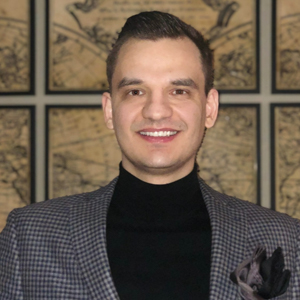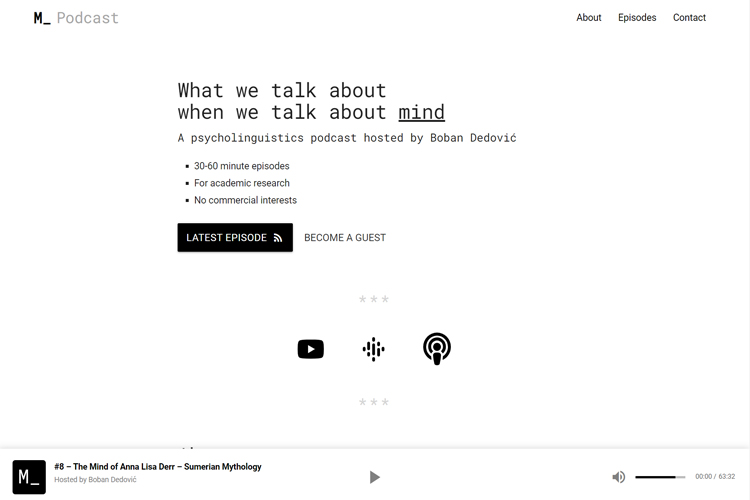Credits
Partial Transcript
Boban Dedović Host
00:11 Hello, I'm Boban Dedović and this is episode six of the "What we talk about when we talk about mind" podcast.
Boban Dedović Host
00:18 Today I have the pleasure of sitting down with Raymond Bentson. He's an international communications consultant and language teacher with almost twenty years of experience in four languages as well as Mandarin Chinese; and he's helped an untold number of students acquire a second language in both business and military settings. Today we're going to discuss French, Spanish, and German–mostly focusing on verbs related to volition and intentionality. We also bring up Latin and Greek to supplement our discussion of philology. This episode is most interesting to me because we touch on topics that are sparse in terms of rigorous academic interest. Because of his wealth of experience, I'm excited to discuss what he talks about when he talks about mind.
Boban Dedović Host
01:03 Our hat for the day is the Greek word φρένες phrenes. It's actually a plural of the singular φρήν phren and it might be related to the word "diaphragm." In the Homeric epics such as the Iliad and Odyssey, the word appears very frequently and oftentimes it gets translated as "mind" or "intention." φρένες phrenes is also special because it's one of these words that can contain another one of these "mind" words in Greek. So, for example, in one passage of the Odyssey, a character's throbbing κῆρ ker, or "heart," is said to be contained within the φρένες phrenes.
Boban Dedović Host
01:45 Sometimes the word νόος nous or noos is said to be contained in the φρένες phrenes as well. But it's also unlike the organ and also unlike other mind words. Sometimes, it refers to the respiratory system or breathing patterns. For example, in the Homeric epics, when a character is sad, it is oftentimes said that grief was "cast into the φρένες phrenes." So that's the word for the day. It's the Greek word φρένες phrenes, and it's an awesome word that's used very much in the Greek Homeric epics.
Boban Dedović Host
02:22 Our book recommendation for the week is Wheelock's Latin by Frederick M. Wheelock. It's been the standard de facto grammar of learning the Classical Latin language for roughly fifty years. And it's composed of forty chapters, which covers all those things that you might expect in an introductory grammar; as well as some very curious moral epithets that every student should be very familiar with. This revised edition is available online and you can get it for a fairly inexpensive price as there are many copies circulating around. So the book recommendation is a language book known as Wheelock's Latin by Frederick M. Wheelock.
Boban Dedović Host
02:59 How are you doing today, Ray?
Raymond Bentson Guest
03:01 Good, doing well, thank you.
Boban Dedović Host
03:04 So tell me a little bit about your education, your background, and your professional activities with respect to both psychology and language.
Raymond Bentson Guest
03:12 I went to school at Western Washington University up in Bellingham, Washington, Washington State. And I started my business, though, in 2016, doing international language and communication consulting. And I did a lot of language training and teaching for professionals. But mainly what I studied in university was within the modern classical languages department. And I studied Spanish literature, French literature, linguistics, and Chinese literature. I was invited up in my last year of the university there to the linguistics department, in the 400 level. And when I went to school in Taichung at Feng Chia University, I got my Chinese language certificate. But, primarily, I use English, Spanish, French, and German here in the United States. And when I do more business in Asia, I tend to do a little bit more work in Chinese.
Boban Dedović Host
04:21 It's great to hear that you have this overwhelming experience in such vastly different language families. Could you talk a little bit more about the nature of language acquisition from your perspective, in a business context; or, to rephrase it, could you tell us the difference between both adults and children with respect to language acquisition?
Raymond Bentson Guest
04:42 Yeah, there's a big difference between language acquisition for adults and children. Young childhood acquisition is very developmental. So that's going to take the place of that kind of unique spot, whether it be psychological or neurological. But you have this pseudoscience that is really popular with marketing, like from Rosetta Stone, saying that you can learn a second language the same way you learned your first, when that's a kind of a unique phenomenon to happen to a child; and sometimes two languages can take that place. Right?
Raymond Bentson Guest
05:24 When a child is raised bilingual, that person will observe and analyze the world thereafter with that first language. And so when I teach languages to adults, we're analyzing through that native language lens. Right? That's the main difference, is that there's a very important thing for me to know as a teacher: what is their native language? And then I can try to go through that perspective.
Raymond Bentson Guest
05:57 I started my research in Germany, January 2013, I believe, and it was very useful that these students were native German speakers and I was teaching them another Germanic language: English. So it helped me to understand English a lot better. Right? And it was a lot easier to give these examples through their own language because it's just a further evolved form of German. Right? You have a lot of these concepts that were born out of German that we use in modern English. So that perspective is a lot easier to deal with.
Raymond Bentson Guest
06:46 Then, one of my research subjects, his spouse is from Poland. Right? So her native language is Polish, a Slavic language. And so that perspective was a lot more difficult for me to try to teach from the perspective of a Slavic language because I don't know any Slavic languages. I just know of them and I know some of the aspects of them. Right?
Raymond Bentson Guest
07:14 So, anyways, my point is that you have, with adults, you have to analyze things from something they already know, their native language. You can present it in a way where they can tear it apart and put it back together through the lens of their native language. With children, they're learning from a blank slate. From that point, from that native language on, they're going to be analyzing the world and language and culture through that lens.
Boban Dedović Host
07:44 Is it accurate to summarize that it's easier for children to learn languages than it is for adults? Is that an accurate characterization of your experience?
Raymond Bentson Guest
07:57 You know, I think that it's hard to say easier or harder. Because I think that it's so situational and it so depends on motivation. I think that I've seen students of mine fail because even though they're smart enough and they might have enough of a natural ability to learn language or whatever, to do it successfully, if they just would not give themselves a barrier by saying, oh, I'm not the same as that guy. Oh, "I didn't learn it as well as this prodigy" or whatever.
Raymond Bentson Guest
08:34 And so, if they lose motivation, then they stop themselves, even though they're perfectly capable and intelligent and skilled enough to do it and be successful. So you have a child who might have a bad memory associated with a language or with that kind of learning environment or whatever and they're totally disenchanted with the process of learning language even though they're maybe really skilled or talented in it or intelligent enough to do it.
Raymond Bentson Guest
09:03 So, from my observation, I think that when you put a box for people saying "are you talented enough to do it [?]," "are you intelligent enough to do it [?]," it's the wrong thing to look at. Because what's way more of a factor is, do they want to do it or are they being forced to do it and what's the motivation of pursuing this thing that is not something you can learn overnight. I know that it's a lot easier for marketing to say, oh, you can do it effortlessly, but that's not how it is. You can't learn a piano effortlessly. Right?
The rest of this transcript is not quite ready. Check back soon.
Works Referenced
(In order of appearance)
Frederick M. Wheelock, Wheelock’s Latin, 7ed. (New York, NY: HarperCollins, 2011). [https://omnika.conscious.ai/stable/453]
Boban Dedović, “‘Minds’ in ‘Homer’: A Quantitative Psycholinguistic Comparison of the Iliad and Odyssey” (Conference Paper, 12th International Conference on the Mental Lexicon, Niagara-on-the-Lake, Ontario, Canada, October 11–14, 2022). [https://omnika.conscious.ai/stable/193; DOI 10.13016/9hwb-kvrx]
Edward T. Jeremiah, The Emergence of Reflexivity in Greek Language and Thought (Leiden, Netherlands: Brill, 2012).
Transcript Notes

Boban Dedović
Person · Psycholinguist
Boban Dedović (Apr. 8, 1989 –) is a Croatian-American psycholinguist, technologist, scholar of ancient languages, and podcast host. He was born in the former Yugoslavia and moved to the United States at the age of seven. He studied both religions of antiquity (B.A.) and social psychology (B.S.) at University of Maryland in College Park before earning his graduate degree from the University of Chicago... Read more
See also: mindspace.studio bobandedovic.com twitter.com

Mindspace Studio Podcast
Website by Boban Dedović
Mindspace Studio is a psycholinguistics-themed podcast hosted by Boban Dedović, a Croatian-American psycholinguist and technologist. It was started in January of 2021 while Dedović was a graduate researcher at the University of Chicago. The program provides thrity to sixty minute episodes focused on language, psychology, and other related fields of study. It is available on YouTube, Apple Podcasts, and Google Podcasts... Read more
See also: youtube.com podcasts.apple.com podcasts.google.com conscious.ai
Heads up
This page contains a Guided Transcript
Whenever you click on a blue link that contains the panel icon chrome_reader_mode, a knowledge panel will appear on the right side of your device.
These panels provide verified, accurate information about people, books, and other things that are relevant to the discussion. The links take you to relevant websites related to source materials, as shown below:
See also: mindspace.studio
